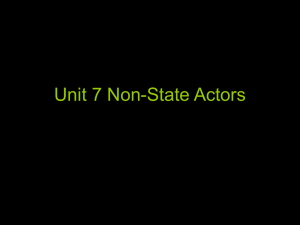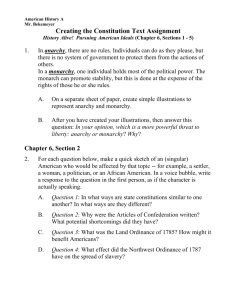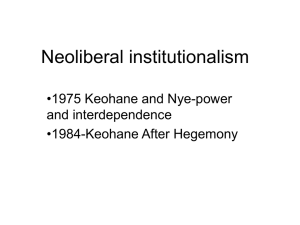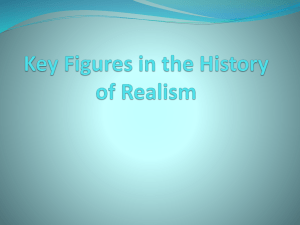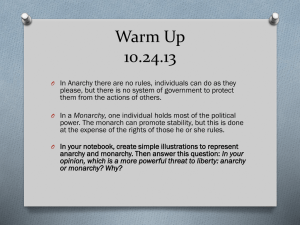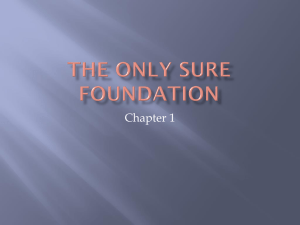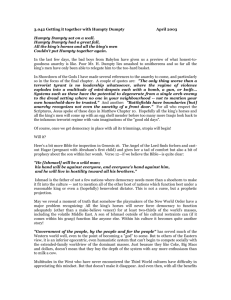Law 12 - Introduction
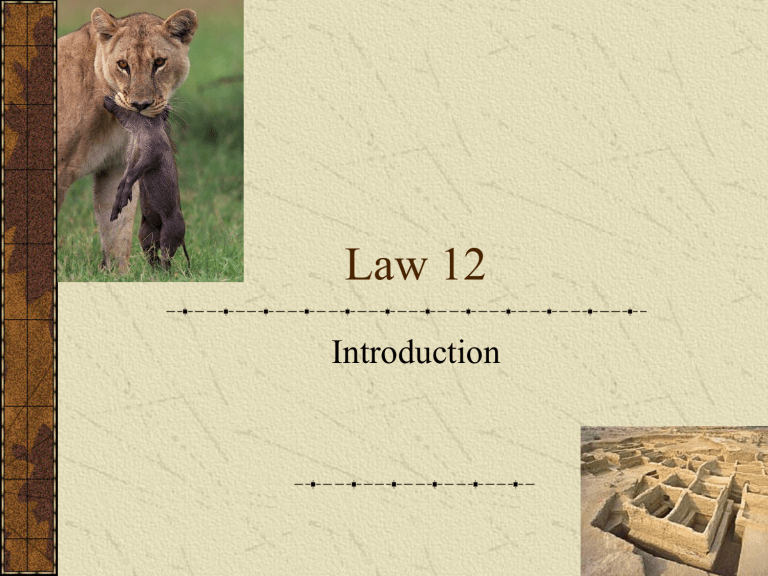
Law 12
Introduction
“Fragile as reason is and limited as law is as the institutionalized medium of reason, that's all we have standing between us and the tyranny of mere will and the cruelty of unbridled, undisciplined feeling.
“
There are no minutes of the Royal Geographic Society or catacombs to show us how, for sure, law originated.
We have no carbon-dating or even anything circumstantial to hook onto.
Language and the written word came a tad late for post-
Neanderthal man's first diddlyings with "law".
Man had been about for 2.5 million years.
And where there is man, nowadays, there is some semblance of law.
Essentially we are alone with our joys, pains, wants, fears and death, in our private sanctuary of thought.
Anthropologists argue that man is a naturally social being, rare the one content with a solitary existence.
Other agree that man is social but partly, if not entirely, out of necessity.
Men need each other for protection, and thus the initial spark of law flew.
Alone, man needs no law. But unless he is bigger, meaner, tougher, smarter and quicker than every other man he ever meets, his safety is not assured.
"Men are not gentle, friendly creatures wishing for love, who simply defend themselves if they are attacked, but that a powerful measure of desire for aggression has to be reckoned as part of their instinctual endowment. The result is that their neighbour is to them not only a possible helper or sexual object, but also a temptation to them to gratify their aggressiveness on him, to exploit his capacity for work without recompense, to use him sexually without his consent, to seize his possessions, to humiliate him, to cause him pain, to torture and to kill him....
"This aggressive cruelty usually lies in wait for some provocation, or else it steps into the service of some other purpose, the aim of which might as well have been achieved by milder measures. In circumstances that favour it, when those forces in the mind which ordinarily inhibit it cease to operate, it also manifests itself spontaneously and reveals men as savage beasts to whom the thought of sparing their own kind is alien. Anyone who calls to mind the atrocities of the early migrations, of the invasion by the Huns or by the so-called Mongols under Jenghiz Khan and
Tamurlane, of the sack of Jerusalem by the pious
Crusaders, even indeed the horrors of the last worldwar, will have to bow his head humbly before the truth of this view of man.
”
- Sigmund Freud
To see man – or “society” – without law one has to look no farther than the animal kingdom.
The lion on the hunt doesn’t worry about fairness or inflicting as little pain as is necessary.
A riot is another a brief window into of anarchy or lawlessness, “the cruelty of unbridled, undisciplined feeling” is unleashed", of which war is an extended version.
Anarchy is another natural occurrence which men quickly realized was both unsafe and unpredictable.
Law produces order by the articulation of rules of conduct or prohibited behaviour, enforceable by some authority - developed from man's growing recognition that a certain state of affairs is unsafe for individuals or communities.
Wanton murder was prohibited (outside of war) because the prospect of sudden gratuitous death tends to create panic attacks.
Theft – formerly known simply as “appropriation by the strongest” - is prohibited because without it, property rights and trade are not impossible, and trade brings new goodies to everybody.
Marriage between persons of certain degrees of consanguinity (eg. incest) is prohibited because those relationships produce no variety and adaptation; thus, a species that cannot compete.
The core societal unit for man is the family. For early man, that was the extent of his community.
With the recession of the ice from the last Ice Age, man ventured from his cave and their families extended their limits, and grew to include relatives, then friends.
Fast-forward thousands of years. Agricultural advances eliminated the need to relocate and man found he could sustain permanent settlement. The best agricultural lands attracted families. Man evolved his pack into little towns.
Rather than the unpredictable life of hunting, man preferred the predictable life which agriculture afforded. Along the coast of the
Black Sea and in present-day Pakistan, settlements were created in 8,000-7,000 BC, such as Jericho, Catal Huyuk and
Mehrgarh , the ruins of which are pictured below.
The larger the population, the safer the town; but the larger the town, the greater the attraction to marauders, and the greater need for even more citizens.
“The first of the great river civilizations of the ancient world ... arose in about 3500 BC, when the people of the fertile lands ... developed ... agriculture that could support large-scale population levels. Whereas their primitive hunter-gather ancestors needed hundreds of acres to support a family unit, the ... farmer needed less than twenty-five. More food meant more mouths could be fed. And, gradually, the owners of these mouths came to live a sedentary life based around the temple and the storehouse.
“Thus did civilization - from the Latin civitas, 'living in a city' begin. For the first time, human beings lived in an environment shaped entirely by their own hands, with the material resources to be spared the constant hunt and labour for food. City life demanded new, complex forms of organization. City life, by thronging together a mass of people, made cultural and technological innovation more likely.
”
- Unknown
“In the very act of associating together: namely, that the whole should protect all its parts, and that every part should pay obedience to the will of the whole, or, in other words, that the community should guard the rights of each individual member, and that is (in return for this protection) each individual should submit to the laws of the community; without which submission of all it was impossible that protection should be certainly extended to any."
- Blackstone
As humans began to recognize the benefits of an absence of the chaos created by anarchy, they experimented law at the whim of a single person (rule of man).
What was important was the “rule of law” – that everyone, no matter how important or rich, be subject.
Law: to enforce order.
Law has therefore been defined as
enforceable rules of order.
In a Canadian court case, Re: Manitoba
Language Rights (Manitoba) , published at 1985 1 SCR 721, the Court noted that:
“Law and order are indispensable elements of civilized life.
The rule of law in this sense implies ... simply the existence of public order. The rule of law expresses a preference for law and order within a community rather than anarchy, warfare and constant strife.
”
The theory was more eloquently put in 1989 by judge
Wood of the British Columbia Supreme Court in R v
Bridges , published at 48 CCC 3d 545:
“It is the rule of law which distinguishes civilized society from anarchy.
Everything which we have today, and which we cherish in this free and democratic state, we have because of the rule of law. Freedom of religion and freedom of expression exist today because of the rule of law. Your right to hold the beliefs you do, to espouse those beliefs with the fervour which you do, and to attempt to persuade others to your point of view, exists only because of the rule of law. Without the rule of law there is only the rule of might.
Without the rule of law the
Canadian Charter of Rights and Freedoms, which some of you sought to invoke, would be nothing but another piece of parchment adrift in the timeless evolution of man's history.
“The rule of law exists in this society only because the overwhelming majority of citizens, irrespective of their different views on religion, morality or science, agree to be bound by the law. That agreement, which cannot be found recorded in any conventional sense, has survived the deepest and most profound conflicts of religion, morality and science.
In that sense it might be thought that its strength is overwhelming and its future secure. But that is not the case at all, for the continued existence of that agreement is threatened by its own inherent fragility.
“Once our laws are flouted and orders of our courts treated with contempt the whole fabric of our freedom is destroyed. We can then only revert to conditions of the dark ages when the only law recognized was that of might. One law broken and the breach thereof ignored, is but an invitation to ignore further laws and this, if continued, can only result in the breakdown of the freedom under the law which we so greatly prize.
”
A New York State judgment of 2006 recognized that ( Frens v. State 831 NYS 2d 347):
“Adherence to the rule of law is what guides us in our everyday social and legal interactions, prevents anarchy, and hold us together as a people.
”
The US Supreme Court, in 1965, in a case cited as Cox v. State of Louisiana 379 US 536
(Justice Goldberg):
“The existence of an organized society maintaining public order, without which liberty itself would be lost in the excesses of anarchy.
"The control of travel on the streets is a clear example of governmental responsibility to insure this necessary order.
A restriction in that relation, designed to promote the public convenience in the interest of all, and not susceptible to abuses of discriminatory application, cannot be disregarded by the attempted exercise of some civil right which, in other circumstances, would be entitled to protection.
One would not be justified in ignoring the familiar red light because this was thought to be a means of social protest. Nor could one, contrary to traffic regulations, insist upon a street meeting in the middle of Times Square at the rush hour as a form of freedom of speech or assembly. Governmental authorities have the duty and responsibility to keep their streets open and available for movement. A group of demonstrators could not insist upon the right to cordon off a street, or entrance to a public or private building, and allow no one to pass who did not agree to listen to their exhortations.
”
The world is a complicated place, with rules and regulations law - for almost all that we do. It is overwhelming for adolescents upon their coming of age and the realization of the limits on their freedoms. Nor is it necessarily selfevident that those limits are essential to the comforts of their lives.
An excellent example of this was the Supreme Court of the United States 1905 case Jacobson v.
Commonwealth of Massachusetts 197 US 11:
"The defendant insists that his liberty is invaded when the state subjects him to fine or imprisonment for neglecting or refusing to submit to vaccination; that a compulsory vaccination law is unreasonable, arbitrary, and oppressive, and, therefore, hostile to the inherent right of every freeman to care for his own body and health in such way as to him seems best; and that the execution of such a law against one who objects to vaccination, no matter for what reason, is nothing short of an assault upon his person.
"But the liberty secured by the Constitution of the United
States to every person within its jurisdiction does not import an absolute right in each person to be, at all times and in all circumstances, wholly freed from restraint.
"There are manifold restraints to which every person is necessarily subject for the common good. On any other basis organized society could not exist with safety to its members.
Society based on the rule that each one is a law unto himself would soon be confronted with disorder and anarchy. Real liberty for all could not exist under the operation of a principle which recognizes the right of each individual person to use his own, whether in respect of his person or his property, regardless of the injury that may be done to others.
"This court has more than once recognized it as a fundamental principle that persons and property are subjected to all kinds of restraints and burdens in order to secure the general comfort, health, and prosperity of the state; of the perfect right of the legislature to do which no question ever was, or upon acknowledged general principles ever can be, made, so far as natural persons are concerned."
Circa 1904, the American Immigration Act prohibited "alien anarchists" which it defined as:
"Persons who believe in or advocate the overthrow by force or violence of the government of the United States or of all government or of all forms of law, or the assassination of public officials."
Ironically, anarchy, simply and objectively refers to an absence of law which is not necessarily a bad thing, although utopian; a
"social theory which regards the union of order with the absence of all direct government of man by man as the political ideal; absolute individual liberty.
“
It is a belief held by some that humans are evolving towards that, kept on the straight and narrow path through the “temporary” gate posts of law, and assisted by education, into persons with innate senses of right and wrong and no predilection to rape or plunder. Thus, no need for law.
"If all men were friends, there would be no need of justice."
- Aristotle
The theoretical evolution of law can be described as follows:
1. Bad anarchy (lawlessness, chaos and gratuitous violence).
2. Rule of Man (Conqueror, Kings,
Queens and Emperors).
3. Rule of Law (senates, parliaments and assemblies).
4. The future – utopia? Good anarchy ?
(no need for government)?
A corollary to all this is perhaps the most important point of all, one for which much ink and blood has been spilled since Man began to tinker with
"government": Government must not ever make law(s) for the simple sake of control; it ought to never interfere with its citizens with a “law” unless there is a public policy reason to do so.
